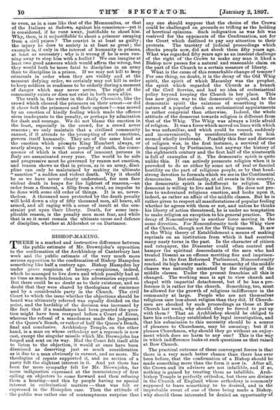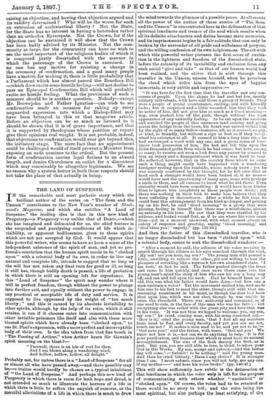BISHOP-MAKING. T HERE is a marked and instructive difference between the
public estimate of Mr. Brownjohn's opposition to the confirmation of the Archbishop of Canterbury last week and the public estimate of the very much more serious opposition to the confirmation of Bishop Hampden something like half a century ago. Bishop Hampden lay under grave suspicion of heresy,—suspicions, indeed, which he managed to live down and which possibly had at no time as much foundation as his adversaries supposed. But there could be no doubt as to their existence, and no doubt that they were shared by theologians of eminence • 'and by a considerable party in the Church. The civil Court to which the issue whether the objections should be heard was ultimately referred was equally divided on the point, and the hardship of the decision was increased by the fact that if a mandamus had been granted the ques- tion might have been reargued before a Court of Error, whereas the refusal of a mandamus made the judgment of the Queen's Bench, or rather of half the Queen's Bench, final and conclusive. Archbishop Temple, on the other hand, is a man on whose orthodoxy not a reproach is now cast, except the singular missile which Mr. Brownjohn has forged and sent on its way. Had the Court felt itself able to listen to the objection, it would at once have been dismissed as deserving just so much consideration as is due to a man obviously in earnest, and no more. No theologian of repute supported it, and no section of a party felt the slightest interest in it. And yet there has been far more sympathy felt for Mr. Brownjohn, far more indignation expressed at the inconsistency of first • calling on objectors to come forward and then refusing • them a hearing—and this by people having no special interest in ecclesiastical matters — than was felt or expressed in the Hampden case. Then the attitude of the public was rather one of contemptuous surprise that any One ChOuld Suppose that the choice of the Crown could be challenged on grounds so trifling as the holding of heretical opinions. Such indignation as was felt was reserved for the opponents of the Confirmation, not for the Court which deblited to pay any attention to their protests. • The travegity of judicial proceedings which shocks people now, did mot shock them fifty years ago. What was regarded fifty years ago as an insolent challenge of the right of the Croft to make any man it liked a Bishop now passes for a natural and reasonable claim on the part of the Church to a certain measure of liberty.
What is the cause of this remarkable change of temper For one thing-,no doubt, it is the decay of the Old Whig spirit, the spirit -of which Macaulay was the prophets the spirit which regarded the Church as a branch of the Civil Service, and had no idea of ecclesiastical policy beyond keeping the Church in her place. This has now given way to the democratic spirit, and to the democratie spirit the existence of something in the nature of a popular check on ecclesiastical appointments is rather congenial than otherwise. Indeed, the whole attitude of the democrat towards religion is different from that of the Whig. The Whig was always a little afraid of religion. It was a force which moved on lines with which he was unfamiliar, and which could be roused, suddenly and inconveniently, by considerations which to him seemed wholly irrelevant. Possibly this fear and distrust of religion was, in the first instance, a survival of the dread inspired by Puritanism, but anyway the history of the eighteenth century and the first half of the nineteenth is full of examples of it. The democratic spirit is quite unlike this. It can actively persecute religion when it is provoked to do so either by some act of real or fancied hostility on the part of religious people, or by that head- strong devotion to formula which we see in the Continental democracies. But ordinarily, at all events in this country, the democratic spirit is indifferent to religion. The democrat is willing to live and let live. He does not pro- fess to understand religious emotion, and looks upon it, indeed, as rather an affair of the middle classes. But he is rather given to respect all manifestations of popular feeling whether he agrees with them or not, and unless he thinks his liberty of action threatened, he is under no temptation to make religion an exception to his general practice. The decay of Nonconformity is another force moving in the same direction. For Nonconformity took the Whig view of the Church, though not for the Whig reasons. It saw in the Whig theory of Establishment a means of making reprisals on an institution from which it had received many nasty turns in the past. In the character of citizen and ratepayer, the Dissenter could often control and hamper the spiritual descendants of the men who had treated Dissent as an offence meriting fine and imprison- ment. In the first Reformed Parliament, Nonconformity reached its high-water mark. The monarchy of the middle classes was naturally animated by the religion of the middle classes. "Under the present franchise all this is changed. The working man is apt to view church and chapel with impartial detachment, but if he has a pre- ference it is rather for the church. Something, too, must be allowed for the growth of religious indifference in the community at large. People who are not themselves religious care less about religion than they did. If Church- men are shocked by such proceedings as those at Bow Church last week, why should they be forced to put up with them ? That an Archbishop should be obliged to have his orthodoxy established by legal investigation, and that his submission to this necessity should be a source of pleasure to Churchmen, may be amusing; but if it pleases Churchmen, why should they go without an enjoy- ment which does no harm to any one? This is the way in which indifference looks at such questions as that raised at Bow Church.
The practical outcome of these convergent forces is that there is a very much better chance than there has ever been before, that the confirmation of a Bishop should be made something more than the form it now is. After all, the Crown and its advisers are not infallible, and if so, nothing is gained by treating them as infallible. Anil- bishop Temple is perfectly orthodox, but there are divines in the Church of England whose orthodoxy is commonly supposed to leave something to be desired, and in the improbable event of one of these being made a Bishop, why should those interested be denied an opportunitrof raising an objection, and having that objection argued and its validity determined ? Who will be the worse for such an extension of ecclesiastical liberty ? Not the State, for the State has no interest in having a heterodox rather than an orthodox Episcopate. Not the Crown, for if the objection can be sustained it will show that the Crown has been badly advised by its Minister. Not the com- munity at large, for the community can have no wish to see the most important of the religious bodies of which it is composed justly dissatisfied with the manner in which the patronage of the Crown is exercised. If no one has any motive for resisting a change in the ceremony of confirmation, and a good many people have a motive for making it, there is little probability that a Parliament which has almost passed the Benefices Bill —which does excite some hostile feeling—will not decline to pass an Episcopal Confirmation Bill which will probably excite no hostile feeling. What the provisions of such a, measure should be is another question. Nobody—except Mr. Brownjohn and Father Ignatius—can wish to see confirmation made an occasion for raking up every unguarded expression into which a Bishop-Elect may have been betrayed in this or that magazine article. Before an objection can be so much as listened to it should be shown that it is of grave importance, and that it is supported by theologians whose position or repute give their opinions real weight. It is not probable, indeed, that objections to confirmation would ever get beyond this, the initiatory stage. The mere fact that an appointment could be challenged would of itself prevent a Minister from exposing an unfit nominee to the ordeal. But the present form of confirmation carries legal fictions to an absurd length, and denies Churchmen an outlet for a discontent which may conceivably be altogether legitimate. We see no reason why a system better in both these respects should not take the place of that actually in being.















































 Previous page
Previous page